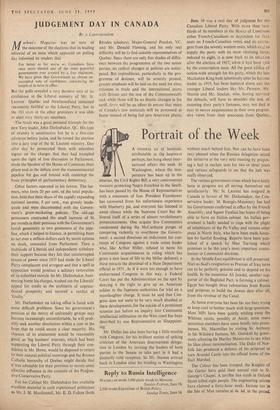Portrait of the Week
A GENERAL air of lassitude, attributable to the heatwave perhaps, has hung about inter- national affairs this week. In Washington, where the tem- perature has been up in the nineties, the Civil Rights Bill, a very controversial measure protecting Negro franchise in the South. has been passed by the House of Representatives with a minimum of fuss. President Eisenhower has recovered from his unfortunate experience with blueberry pie, and everyone has listened in awed silence while the Supreme Court has de- livered itself of a series of almost revolutionary pronouncements. One acquits five Communists condemned during the McCarthyite purges of conspiring violently to overthrow the Govern- ment; a second dismisses an indictment for con- tempt of Congress against a trade union leader who, like Arthur Miller, refused to name his Communist acquaintances (a ruling which has given a new lease of life to the Miller defence); a third retracts the dismissal of a State Department official in 1951. As if it were not enough to have embarrassed Congress in this way, a Federal Court has put the Administration on the spot by denying it the right to give up an American soldier to the Japanese authorities for trial on a manslaughter charge. It must be said that Con- gress does not seem to be very much abashed at these developments, for the suicide of a prominent scientist just before an inquiry into Communist intellectual infiltration on the West coast has been described by one Representative as 'Clisappoint- ing.'
Mr. Dulles has also been having a little trouble with Congress, for his brilliant notion of spiking criticism of the American disarmament delega- tion in London by inviting the leaders of both parties in the Senate to take part in it had a distinctly cold reception. So Mr. Stassen arrived back in London after his briefing in Washington without much behind him. Nor can he have been very pleased when the Russian delegation seized the initiative at the very next meeting by propos- ing a halt in nuclear tests for two or three years and various' safeguards to see that the halt was really obseryed.
The various government crises which have lately been in progress are all sorting themselves out satisfactorily : Mr. St. Laurent has resigned in Canada in favour of Mr. Diefenbaker, the Con- servative leader; M. Bourges-Maunoury has had his Government confirmed in office by the French Assembly; and Signor Fanfani has hopes of being able to form an Italian cabinet. An Italian gov- ernment is badly needed to cope with the plight of inhabitants of the Po Valley and various other areas in North Italy, who have been made home- less by fearful flooding. Reports have been pub- lished of a speech by Mao Tse-tung which promises to be this year's most important contri- bution to Communist doctrine.
In the Middle East equilibrium is still preserved. Nun i es-Said's resignation as Premier of Iraq turns out to be perfectly genuine and to depend on his health. In the meantime Ali Jawdat, another sup- porter of the Baghdad Pact, is forming a cabinet. Egypt has bought three submarines from Russia and proposes to build the Aswan dam after all, from the revenue of the Canal.
At home everyone has been far too busy trying to keep cool to bother much with large questions. Most MPs have been quietly whiling away the Whitsun recess, possibly at Ascot; some more notorious members have come briefly into prom- inence, Mr. Macmillan by visiting Sir Anthony in his Wiltshire fastness, Mr. Gaitskell by gener- ously allowing Sir Hartley Shawcross to say what he likes about nationalisation. The Duke of Nor- folk has produced a defence of his proposal to turn Arundel Castle into the official home of the Earl Marshal.
The Colour has been trooped, the Knights of the Garter have paid their annual visit to St. George's Chapel. A terrible bus crash in Oxford Street killed eight people. The engineering unions have claimed a forty-hour week. Income tax in the Isle of Man remains at 4s. 6d. in the pound.


































 Previous page
Previous page